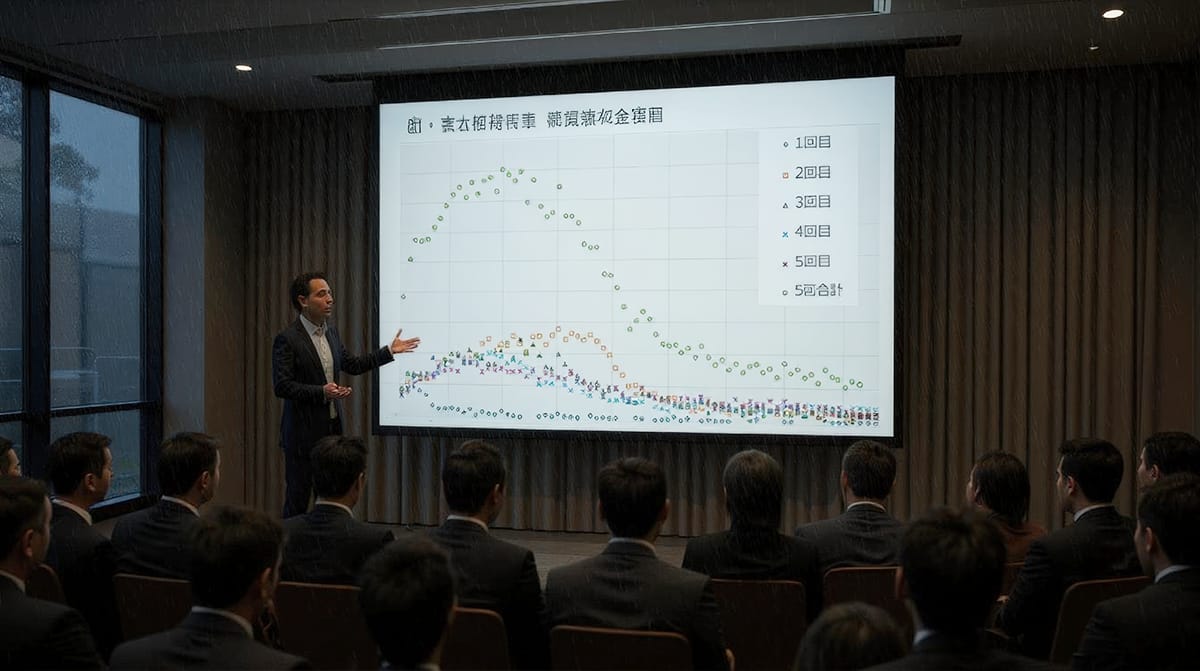- Vejon MED
- Posts
- When Citizens Lead the Science:
When Citizens Lead the Science:
Volunteers in Japan Discover Delayed Mortality Spike After mRNA Vaccination


A Message from Dr. McMillan
The Japanese scientific community has repeatedly shown a commitment to uncovering truth, even when it challenges the prevailing narrative.
Their latest findings should serve as a wake-up call for the global scientific and medical establishment to take urgent action to protect population health.
Yet the continued inertia suggests that patient advocacy is no longer the top priority.
If institutions won’t lead, it may be left to the people to carry the fight for transparency, accountability, and real solutions.
Dr. Philip McMillan
In this week's July 18, 2025 update:
Covid-19: Delayed mortality spike after mRNA vaccination
Vejon: This week’s featured Vejon video
Health: Staying positive might protect against memory loss
Infographic: When citizens lead the science
News: Medical news in brief
Education: Covid Heart STORM
Read time: 6 minutes
FEATURE ARTICLE
COVID-19
Japanese volunteers analyzed 21 million vaccination records, finding mortality spikes 90-120 days after vaccination.
Each additional vaccine dose appeared to shorten the time to peak mortality rates.
Traditional 28-day monitoring windows miss delayed deaths occurring months after vaccination.
Estimated 600,000-610,000 excess deaths in Japan may be temporally associated with vaccination campaigns.
Why this is important: Citizen researchers may have exposed a critical blind spot in vaccine safety monitoring. If deaths peak months after injection rather than days, current surveillance systems would miss them entirely, potentially contributing to an incomplete explanation for persistent excess mortality in highly vaccinated populations worldwide and demanding immediate professional investigation..
SUPPORT VEJON MED
SUPPORT education in science and medicine. Your ONE-TIME donation will help us maintain our independence, compensate our dedicated team, and continue delivering high-quality content free from industry influence.
HEALTH
Research found higher wellbeing predicts better memory performance in people over 50, not vice versa.
The wellbeing - memory connection remained strong even after accounting for depression and other mood factors.
Study limitations include self-reported data, inability to prove causation, and simple memory tests used.
Five evidence-based strategies can boost wellbeing: gratitude, kindness, relationships, presence, and flow states.
Why this is important: Prioritizing mental wellbeing emerges as a practical strategy for cognitive health in aging populations. Rather than accepting memory decline as inevitable, individuals can actively invest in positive emotions and life satisfaction potentially maintaining sharper cognitive function, offering hope for healthier aging through accessible lifestyle modifications.
INFOGRAPHIC
EDUCATION
Covid Heart STORM
Discover how repeated exposure to the COVID spike protein can silently damage the heart.
What is the deadly triangle of immune misfire? Whether you're a clinician, researcher, or health-conscious learner, this course will challenge what you thought you knew about myocarditis, arrhythmias, and long COVID.
MEDICAL NEWS IN BRIEF
NEWS HIGHLIGHTS
🚥 How Soup Might Soothe Symptoms and Support Recovery From Colds and Flu: Validating age-old wisdom, soup consumption during respiratory infections shows measurable benefits—reducing recovery time by 2.5 days and lowering inflammatory markers. This affordable, accessible remedy could significantly reduce healthcare burdens while offering culturally resonant self-care, though more research examining standardized recipes and real-world outcomes remains essential for comprehensive understanding.
🚥 Obesity More Likely Caused by High Calorie Diet Than Lack of Exercise: Contrary to conventional wisdom blaming sedentary lifestyles, people in wealthy nations actually burn comparable daily energy to those in developing countries. Caloric intake emerges as obesity's primary culprit. This insight should fundamentally reshape public health strategies, emphasizing dietary intervention alongside exercise rather than focusing predominantly on increasing physical activity levels. [SOURCE]
🚥 Want to Boost Your Brain as You Age? Music Might Be the Answer:
Musical training creates a neurological buffer against aging's cognitive toll. Musicians' brains maintain youthful connectivity patterns while processing speech-in-noise, unlike non-musicians who require compensatory neural overactivation. This supports "cognitive reserve" theory—accumulated experiences preserve neural efficiency. Rather than merely compensating for decline, lifelong musical practice appears to hold back age-related brain changes entirely. [SOURCE]
🚥 AI In Health Care Could Save Lives And Money − But Change Won't Happen Overnight: Healthcare's AI revolution faces a paradox: while promising $360 billion in annual savings and millions of lives saved, adoption remains sluggish due to algorithmic drift, racial bias, privacy concerns, and unrealistic expectations. Current implementation focuses on administrative tasks rather than clinical decisions, suggesting transformative medical AI will emerge gradually through incremental integration.
🚥 Your Neighborhood's Restaurant Menus May Predict Your Health Outcomes: Direct analysis of millions of menu items reveals meaningful connections between neighborhood food quality and resident health outcomes. Researchers found areas offering fiber-rich, nutritious options correlate with lower obesity rates, while wealthier neighborhoods consistently access better dietary choices. This granular approach transcends traditional food desert mapping, providing actionable insights for targeted public health interventions. [SOURCE]
🚥 People with 'Young Brains' Outlive 'Old-Brained' Peers: Analyzing blood proteins to measure individual organ aging could revolutionize preventive medicine. This method accurately predicts disease onset decades in advance. Those individuals with biologically aged brains face 12x higher Alzheimer's risk. Brain aging emerged as the strongest mortality predictor overall, potentially enabling targeted interventions before symptoms appear. [SOURCE]
BOOK NOOK
"Disease X: Are You Prepared?" is your comprehensive guide to navigating the uncertain future of global health. Drawing from experience and the latest scientific insights, this book offers:
|





